.
|
To Vassily Ivanovich Grigorovich
in memory of April 22, 1838
All flows and all passes — this goes on forever....
Yet where does it vanish? And whence did it come?
The fool does not know, and the sage knows no better.
There's life... then there's death.... As here blossoms a one,
Another there withers beyond a returning....
Its yellow leaves fall, to be green never more.
But still the bright sun will come up in the morning,
At nightfall the stars will come out as before
To swim in the heavens, and then, gentle sister,
You too, silver moon, will come out for a stroll,
You'll glance as you pass into puddles and cisterns,
And sparkle the oceans — you'll shine as of old
You shone over Babylon's fabulous gardens,
And as ages from now you will still be regarding
What haps to our children. Forever you'll glow!
I tell you my notions, my heart I unburden,
And sing you the muses inspired by yourself.
Oh, what shall I do with my onerous burden?
Advise me, for I am not just by myself,
I've children: what am I to do with my offspring?
To bury them with me? That would be a crime —
The soul is alive. Its ordeal may be softened
If someone will read these word-teardrops of mine,
The tears that were shed in the night, in seclusion,
The tears that were poured from the heart in profusion.
I'll not have them buried, for they are alive!
And as the blue sky overhead has no limit,
There's also no start and no end to the spirit.
And where does the soul stay? Those words are but guile!!
May it on some heart here on earth leave an imprint —
Because it is hard unremembered to die.
Oh girls, to remember you first are obliged!
For it always loved you, my roses, sincerely,
And tenderly strove your sad lot to describe.
So rest ye in peace until daybreak, my children,
The while I consider who should be your guide.
My sons, my Haidamaki brave!
The world is free and wide!
Go forth, my sons, and make your way —
Perhaps you'll fortune find.
My sons, my simple-minded brood,
When you go forth to roam,
Who will receive my orphans poor
With warmth into his home?
So fly, my fledgling falcons, fly
To far Ukraine, my lads —
At least, if there you hardship find,
'Twon't be in foreign lands.
Good-hearted folks will rally 'round
And they won't let you die;
While here.... Well, here... it's hard, my sons!
If you're allowed inside
The house, it's only to be jeered —
You see, they are so wise,
So literate and so well-read,
The sun they even chide:
"It does not rise the proper way,
Nor shine the way it should;
Now, here's the way it should be done...."
So what is one to do?
You must pay heed, perhaps indeed,
The sun's not rising right,
The way they read it should in books....
Oh, they are brainy, quite!
About you, then, what will they say?
I know what fate is yours!
They will poke fun and laugh their fill,
Then throw you out of doors.
"Let them stay there," they'll say, "until
Their father will get wise
And in our language tell his tale,
His hetmans old describe.
The fool, instead, is holding forth
In language obsolete,
And a Yarema in bast shoes
Brings out for us to see.
The fool! He hasn't learned a thing
Though he was soundly caned.
Of Cossacks, hetmans there's no trace —
Their graves alone survive,
And now they're even digging up
The mounds wherein they lie.
And he wants us to listen to
What the old minstrels say.
Your labour's lost, sir: if you aim
To make yourself a mint
Of money, and a lot of fame,
Then of Matryosha sing,
And of Parasha, charming witch,
Parquet, gold braid and spurs.
Then you'll make good!! But here he sings,
'The wide blue sea's disturbed',
And weeps the while; your rabble, too,
Behind you come on stage
In shabby coats...." My thanks to you
For your advice so sage!
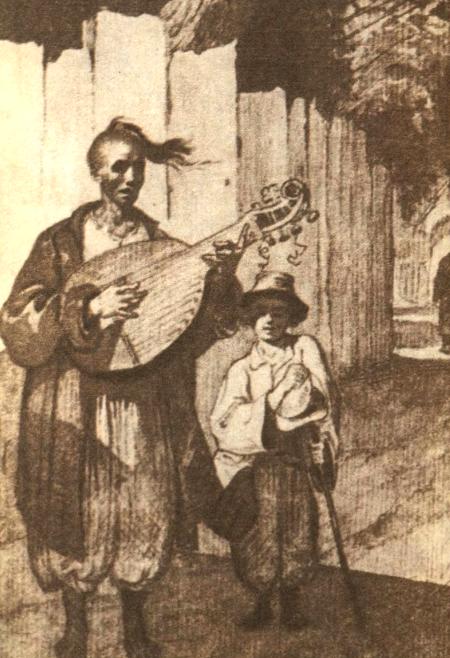
Illustration by Taras Shevchenko. "Blind Man" or "The Captive".
Sepia. 1843.
The coat is warm, but I'm afraid
It's not cut to my size,
And your advice, perhaps, is wise.
But it is lined with lies.
Excuse me, please!... Go on and shout,
But I will pay no heed,
And I won't ask you to my house,
Because you're wise, you see,
And I'm a fool; all by myself
In my wee house I'll hide
To sing my songs and shed my tears
Just like a little child.
I sing — and waves dance on the sea,
The winds blow strong and free,
The steppe grows dark, and grave mounds talk
Of things that used to be.
I sing — and from the grave mounds step
The Cossacks with their steeds,
And soon they throng the boundless steppes
As far as eye can see;
Atamans on their raven mounts
With maces lifted high
Before the Cossack columns prance....
Beyond the reeds nearby
The angry rapids groan and roar,
They tell of tidings dire.
I listen and my heart is sore.
Of oldsters I inquire:
My fathers, tell me why you mourn?
"No cause is there for cheer!
The Dnieper's angry with us, son,
Ukraine is all in tears...."
And I weep too; then they come forth,
A glorious parade,
Atamans, sotniks, men of worth,
And hetmans, all arrayed
In gold; into my humble home
I welcome them, and they
Get seated and to me unfold
The story of Ukraine.
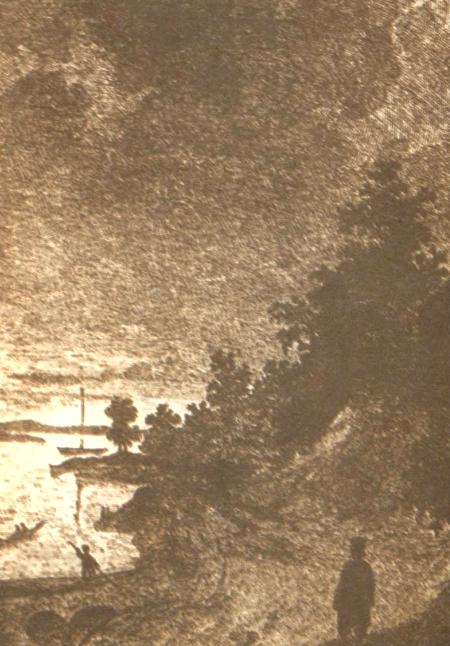
Illustration by Taras Shevchenko. Vidubetsky Monastery in Kiev.
Detail. Etching. 1844.
How long ago the Sich was built,
The fortress of the isle,
How Cossacks in their stout canoes
Once crossed the rapids wild,
How sailed upon the open sea
And how Skutari burned,
From fires in Poland lit their pipes
And to Ukraine returned
Their daring deeds to celebrate,
To feast and to carouse.
"Innkeeper, pour! Play, minstrel, play!"
The Cossacks blithely shout.
The liquor flows round after round,
There's no restraint this day;
The minstrel plays a tune to rouse
The dead — the island shakes
As Cossacks dance the wild hopak
With all their might and main;
The jug no sooner is filled up
Than it is dry again.
"Make merry, coatless gentlemen,
As free as wind at play!
Let's have more music, more to drink,
Make merry while we may!"
Both youth and oldsters join the dance,
Their feet like lightning fly.
"Ah, that's the way! Go to it, sons!
You'll make good bye-and-bye!"
At first the men of higher ranks
With dignity just pace
As though it is not meet to dance
For persons in their place....
Then their feet too begin to prance
Despite their weighty years.
I watched the dashing Cossack dance
And laugh through brimming tears.
I look on with laughter, my eyes overbrimming....
I'm lonely no longer, I've friends at my side!
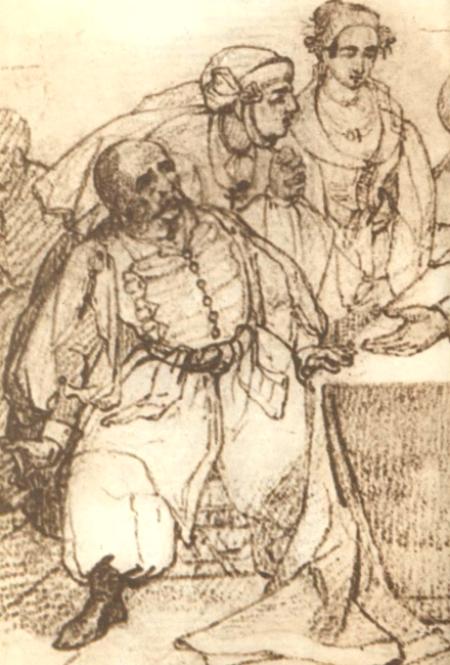
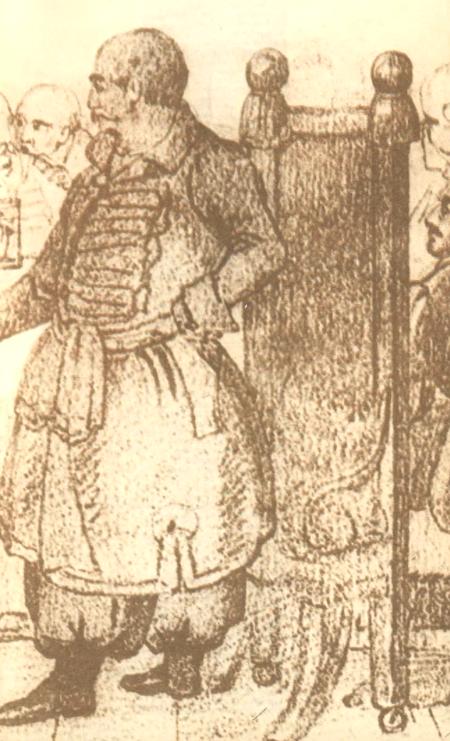
Illustration by Taras Shevchenko. Cossacks Feasting. Detail.
In my modest dwelling the Cossacks make merry,
The rushes are rustling, the steppe stretches wide;
In my little cottage the blue sea is sounding,
A poplar-tree whispers, a grave mound complains,
A maiden sings softly of lov e in the springtime —
I'm lonely no longer, I've plenty of friends!
That's where my gold, my wealth I find,
That's where my glory lies!
As for your counsel — you're too kind!
Thanks for your false advice.
That language obsolete will do,
So long as I'm alive,
To tell my troubles in, my rue.
So I bid you good-bye!
I'll go to see my children off,
They must be on their way.
Perhaps somewhere they'll come across
A Cossack old and grey,
Who'll open up his arms to them,
Greet them with trembling tears.
And as for me, I say I am
A peer above all peers!
Thus, seated at the table's end,
I think: Whom should I ask?
Who will agree to guide my sons?
The new day dawns at last;
The moon retires, the sun is red.
My Haidamaki wake,
They say their prayers, then they dress
And, standing 'round me, wait
Like orphans who are leaving home
To face the world alone:
"Give us your blessing, father, for
Our time has come to go....
So wish that fortune we may find
As o'er the earth we roam."
But wait.... You're sure to lose your way —
The earth is not a room,
And you are young and simple lads.
Who'll show you where to go?
Who'll guide you? Who will walk ahead?
My sons, I'm worried so!
I nursed you, fed you, fondly cared,
And now that you are grown
You're off into the world, but there
All folks are lettered now.
Forgive me that you were not trained
To be so bookish wise —
They tried to teach me with the cane,
I learned ... but otherwise!
I know the alphabet, of course,
But not the things they prize.
What will they think of you, my sons?
Come, let us find your guide!
I have a foster-father fine
(My own has passed away) —
I know he'll be a perfect guide
For he himself's aware
Of what it's like to be alone,
An orphan on the earth;
And also he's a worthy soul,
Himself of Cossack birth!...
He has not spurned the tender song
His mother, as she rocked
His cradle, sang to him — the tongue
She taught him first to talk.
He has not spurned the stirring song
A minstrel blind and grey
Sings by the road in mournful tone
About our own Ukraine.
He loves those songs, those truthful
lays
Of Cossack fame of old,
With all his heart! So let us make
Our way to his abode.
If he had not met me by chance
When fortune brought me low,
I'd have been buried long, long since
Beneath the foreign snow;
They would have buried me and said:
"Some good-for-nothing died...."
Oh, it is difficult indeed
To suffer, not know why.
That's past and gone, so let it be!...
Let's go to him, my lads!
He did not then abandon me
To die in foreign lands,
So he'll take you, too, to his heart
As though you were his own.
And then, a prayer, and you start —
Off to Ukraine you go!
Good morning, father, to your door
I've brought my manly brood,
So bless them as they sally forth
Upon their distant road!
St. Petersburg,
April 7, 1841.
Original publication: Тарас Шевченко. "Гайдамаки".
Вступ ("Все йде, все минає — і краю немає")
* * *
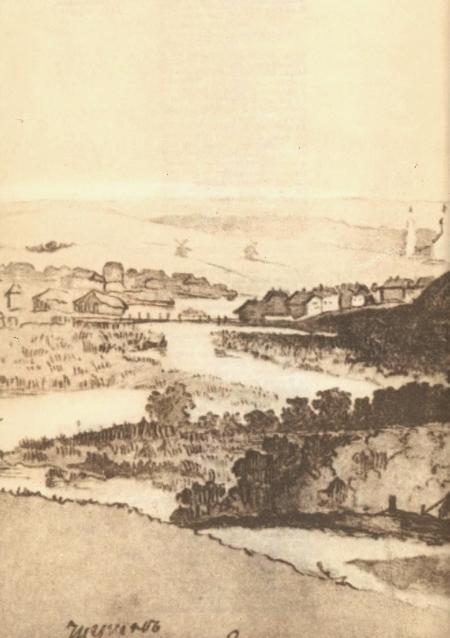
Illustration by Taras Shevchenko. Chihrin Viewed from the Subotiv Road.
Detail. Water-colour. 1845.
INTRODUCTION
The nobles once ruled Poland's roost,
A very haughty lot;
With Muscovites they measured swords,
The Turk and Tatar fought,
And Germans too.... Yes, once 'twas so....
But all things pass away.
The high-born braggarts used to strut,
And drink both night and day,
And with their kings play ducks and drakes.
Not with Sobieski Jan,
Nor yet Batory: those two were
Not of the common run —
But with the rest. And they, poor souls,
In fear and trembling ruled.
The conclaves, big and little, fumed,
And Poland's neighbours viewed
A spectacle — how Polish kings
The Polish kindom fled,
And listened how the noble mob
The sejms brought to an end.
"Nie pozwalam! Nie pozwalam!"
The haughty nobles roared,
While the big magnates stoked up fires
And tempered well their swords.
This lasted for a lengthy time
Until to Warsaw-town
The lively Poniatowski came
To occupy the throne
And undertook to some degree
The noble breed to squelch....
He failed! He wanted what was best,
Or maybe something else.
Only their veto — that one phrase
To take from them he sought.
And then.... All Poland burst in flames,
The gentry ran amok....
"The king's a villain, scoundrel vile,
A Moscow tool!" they cry.
At Pac's appeal, Pulawski's call
The Polish nobles rise.
A hundred leagues — Confederates —
All Poland they inflamed,
Lithuania they overran,
Moldavia, Ukraine;
They scattered wide and they forgot
That freedom was their aim —
They joined with Jews in compact foul
To rob and devastate.
They ran mad riot through the land,
They churches set ablaze....
The Haidamaki then began
To sanctify their blades.
Original publication: Тарас Шевченко, поема "Гайдамаки". "Інтродукція"
* * *
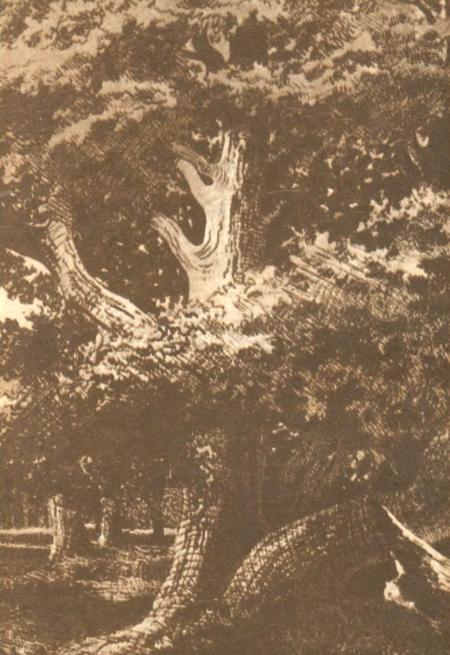
Illustration by Taras Shevchenko. Oak-Tree. Detail. Etching, aquatint. 1860.
THE CHURCHWARDEN
“The grove is silent,
The wind is quiet,
The moon is sailing,
The stars are sparluing,
Come out - I’m waiting
For you, my darling;
Come out and meet me
Tonight, my sweetling!
My dear, I’m pleading,
Come to your lover,
We’ll hold each other,
For I am leaving '
This night to wander.
Come out, my darling,
We’ll share our sorrow,
Dream of tomorrow,
Cling to each other....
How sad is parting!”
Yarema sadly sang this song
While strolling by the grove;
He waited for Oksana Tong -
Until he gave up hope.
The stars came out; a silver ball,
The moon shone in the sky;
The willow gazed into the well
And listened as nearby
A nightingale gave all he had
In heart-entrancing trill,
As though he knew the Cossack lad
Was waiting for his girl.
But poor Yarema’s heart was sore,
He barely dragged his feet
And did not look or listen more....
“What use are looks to me,
When only misfortune, no luck have I got?
The years of my youth flit away all for naught.
Alone in the world. I’ve no kinfolk or home -
A straw in the field that’s blown hither and yon.
The wild winds soon carry away the lone straw:
And that’s how by people I’m buffeted too.
Why do they thus treat me? Because I’m alone.
There was but one heart on the earth that was true
One person that loved me, now that too is done,
She too has forsaken me.”
Tears filled his eyes.
The poor fellow wept there alone in the grove,
Then said his farewells. “Oh my darling, good-bye.
Out on the big highway my lot I’ll improve,
Or else I will perisn.... And you will not cry,
You won’t know about it, and you will not see
How ravens are pecking these Drown Cossack eyes,
The eyes which you fondly once kissed, oh my sweet!
Forget this poor orphan - and seek someone new!
Forget that you promised that you would be mine -
For I, a poor vagrant, am no match for you,
A churchwarden’s daughter. A better you’ll find....
So take whom you will.... And, my darling, don’t fret,
Don’t worry about me... for such is my fate.
But if you near tidings that I’ve met my death,
Go off by yourself then and quietly pray.
Just you in all the world, my dear,
Just you for me will pray!”
He bowed his head and heavy tears
Came coursing down his face.
He leaned despondent on his staff....
A rustle!... Ana he peered:
Like some woods creature slipping past
The trees, Oksana neared.
He forgot everything and raced....
“My sweetheart!” both exclaimed.
Hearts overbrimming, they embraced
Again and yet again.
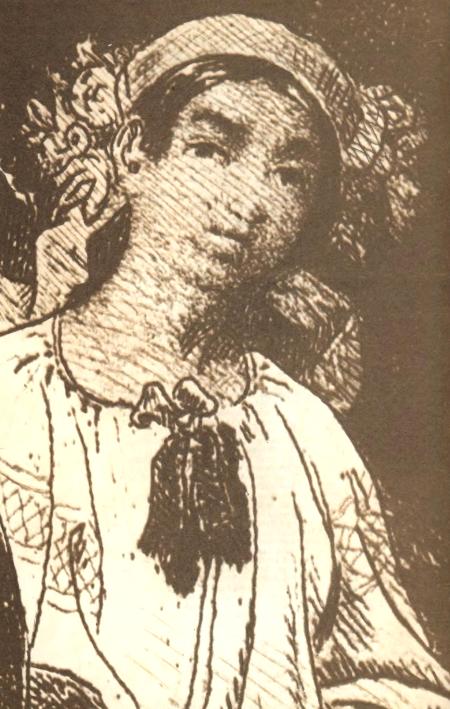
Illustration by Taras Shevchenko. Two Girls. Detail.
“Enough, my sweet!”
“A wee bit more....
Some more, my turtle-dove!
Oh, hold me to your heart, my own...
How tired I am, my love!”
“Sit down and rest, my shining star
That dropped down from the sky!”
He spread his cloak upon the ground.
With star-lit eyes she smiled.
‘Then you must sit beside me too.”
They held each other tight.
“My shining star, my sweetheart true,
What held you up tonight?”
‘Tonight I couldn’t come on time:
My father’s ill, you see -
I had to nurse him all this while...”
“And didn’t think of me?”
“How can you speak about me so!"
And tears came to her eyes.
"Don’t cry, my dear, I only joked."
"A joke!"
Again she smiled.
She laid her head upon his breast
And seemed to fall asleep.
"You see, Oksana, I just teased
And you began to weep.
Now don’t you cry, ana look at me,
Whom long you will not see.
Tomorrow I’ll be far from here,
Oksana, far away....
At Chihirin tomorrow night
I’ll set my blessld blade.
Witn it I’ll silver gain, and gold,
And fame will be my prize;
I’ll dress you rich from head to toe
Like bird of paradise,
And seat you on a tripod stool
Just like a Hetman’s wife,
And look at you... My whole life through
On you I’ll feast my eyes."
"Ah, but perhaps you will forget?
When rich, in Kiev-town
Yourself a high-born bride you’ll get,
Oksana you’ll disown!..."
"Is there one lovelier than you?"
"I do not know. Perhaps...."
"Don’t anger God, because, in truth,
All beauties you surpass!
Not in the sky, beyond tne sky,
Nor yet across the sea
Can one find beauty such as thine!"
"Oh hush! You must not say Such crazy things!"
"But that’s a fact!"
Thus, far into the night
Yarema and Oksana talked,
And only stopped to plight
Their love with ardent, sweet caress;
Sometimes they wept with pain
That they must part, and then embraced
And pledged their love again.
How they would live, Yarema told,
When home again he came,
How he’d obtain a lot of gold,
How fortune he would gain,
How Haidamaki planned to slay
All Poles in the Ukraine,
How he’d be master, not a slave,
If he alive remained.
Oh girls, he talked till one was bored
To hear him talk that way!
"Go on with you! As though we could
Be bored!"
So you may say,
But if your dad or mother should
By chance find that you read
Such sinful tales, I’m sure they would
Tell you what’s what, indeed!
Well then... but no, it’s such a tale
We cannot help but read!
I know, you’d like me to relate
How ’neath a willow-tree,
Beside a pool, a handsome lad
Tells of his hopes and love,
How they embrace, how he is sad
And she, a turtle-dove,
Smooths out his brow, the while she feels
As though her heart will break.
“My dear, you’re eveiything to me!
You are my love, my fate!
My all!...’’ The willows, even, bent
The things they said to hear.
Now there was talk! But I won’t tell
Those things to you. my dears,
Especially since nignt is nigh -
You’d dream about them yet.
We’ll let the lovers say good-bye
The same way that they met -
With quiet-spoken gentle words
That nobody could near,
And none could see the stricken girl’s
And sad lad’s parting tears.
Leave them alone.... Perhaps they’ll meet
Again while they’re alive
Upon this earth.... Well, we shall see....
But meanwhile, what’s the light
That makes all windows bright
In the churchwarden’s home?
Let’s take a look inside....
Oh would we had not known!
I wish we’d not seen it, did not have to tell!
Because the heart’s burning for humans with shame.
Those are the Confederates - look at them well -
Who banded together, with freedom their aim.
Look how they are serving in fair freedom’s cause....
May they all De damned, and their mothers be cursed
Because they gave birth to such monsters on earth!
Look what they are at in the churchwarden’s house,
The hounds from hell.
The roaring fire in the hearth
The entire house lit up.
Backed in the corner, Leiba shrank
And cowered like apup.
The Poles roared: "Tell us where’s the gold,
Or die!"
The warden never told.
They tied his hands tight with a rope,
Then threw him to the floor -
But not a word.
"Bring red-hot coals!
And bring some boiling tar!
Drip tar on him! So! Are you cold?
The coals now let him have!
You rascal, will you tell or no?
Oh, he’s a stubborn knave!"
They poured some coals into his boots....
“Drive nails into his head!"
He stood all torture that he could,
The warden then fell dead
Without the holy sacrament!
"Oksana...!" and he died.
The frenzy of the Poles then ebbed.
“What now? Let us decide
What we’re to do now, gentlemen,
That he’s out of our reach!
Let’s bum the church down!
"People, help!"
Like some unearthly screech
The sudden cry fell on their ears.
The Poles were petrified.
Oksana at the door appeared.
"They've murdered him!" she cried
And senseless fell.
The leader waved His hand, and they slunk out
Like downcast hounds. And then
the maid.
He lifted, left the house....
Yarema! But he nothing knows,
And tramping, sings a song
Of Nalivaikors fight with Poles.
The gentry soon were gone,
And took Oksana, still aswoon.
The dogs barked some, but soon they too
In silence their night vigil kept.
The moon turned pale; the people slept,
The warden too.... He won’t rise soon;
He’s gone to his eternal rest.
The nre died down, then flickered out....
The warden’s body seemed to move,
Then dismal sadness reigned throughout.
Original publication: Тарас Шевченко. Поема "Гайдамаки". "Титар"
* * *
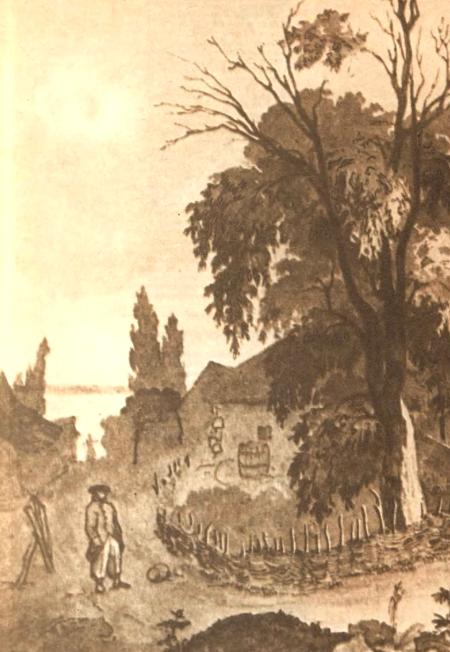
Illustration by Taras Shevchenko. Peasant and The Tree. Pencil. 1843.
THE THIRD COCK’S CROW
The frenzied gentry one more day
Spread terror through Ukraine;
Just one more day the country lay
In torture and in pain.
And then the Day of Maccabees,
A saint-day in Ukraine,
Was past.... The Pole and Jew at feasts
With blood their liquor drained,
Complained the plunder was too poor,
Schismatics they condemned.
The Haidamaki waited for
Their foes to go to bed.
At last they went - nor dreamed that ere
The dawn they would be dead.
The Poles soon slept, but Jews
Remained awake, without a light
To count their profits in the night,
Out of the public view.
Their heads, then, pillowed on their gold
They too droppea off to sleep.
And so they slept.... Forever may they sleep!
And then tne moon came out to make a tour -
The sky and stars to see. the earth and seas,
To watch the people ana observe their deeds,
And tell it all to God when night is o’er.
The silver moon shines over all Ukraine,
But does it see my hapless orphan maid,
Oksana, snatched from her Vilshana home?
Where does she languish, where in anguish weep?
And does Yarema know? Well, we shall see,
We’ll find out later, but I now propose
Another song to sing and tune to play;
Malevolence will dance - not maidens gay.
I sing the Cossack country’s sorry fate;
Now listen closely, later to relate
It to your children, they to theirs, so they
Should know how Cossacks made the gentry pay
For their misrule, when Polish lords held sway.
A long, long time the clamour dread
Resounded through Ukraine,
A long, long time the blood ran red
In streams across the plains.
It ran in rivers, then it dried.
The steppes are green again:
In Cossack graves our grand-dads lie,
Their grave mounds dot the plain.
What of it that the mounds are high?
Nobody knows they’re there,
Or whose the bones that ’neath them lie,
Nobody sheds a tear.
As it blows through, the wind alone
A gentle greeting says,
The dew alone at break of dawn
With tender teardrops laves.
The sun then turns its rays on them,
It dries and makes them warm;
Their grandsons? Oh, they’re not concerned -
For lords they’re growing com!
They’re numerous, but ask if one
Knows where is Gonta’s grave -
Where did the tortured martyr's bones
His faithful comrades lay?
Where’s Zaliznyak, that splendid soul,
Where sleeps that manly heart?
It’s hard to bear! The hangman rules,
While they forgotten are.
A long, long time the clamour dread
Resounded through Ukraine,
A long, long time the blood ran red
In streams across the plains.
O’er all the earth it cast a pall;
This horror day and night
Was ghastly, yet when we recall
Those deeds, the heart is light.
Oh bright-shining moon! Climb down from the sky
And hide behind hills, don’t give us your light;
For you’ll be appalled, although you have seen
At Alta and Ros. and also the Seine,
Whole oceans or blood, spilled no one knows why.
But what will be now! My friend, leave the sky
And hide behing hills, for viewing that scene
E’en you’d have to cry.
High in the sky the silver moon
Sheds melancholy light.
Beside the Dnieper, a young man
Is walking in the night,
It may be from a party gay.
But why is he so sad?
Perhaps he’s poor and so the maid
Will not give him her hand?
Oh no. she pledged she’d be his bride
Though he is dressed in rags.
Why then, with such heart-rending sighs
His feet he barely drags?
The Cossack feels that all’s not well,
That some ill-fortune waits.
The heart can feel but cannot tell
What’s held in store by fate.
The country ’round seemed not asleep
But wholly desolate,
As though no human life remained.
Not even dogs or birds:
lust from the woods, a mournful strain -
The howl of wolves - is heard.
No matter! For Yarema walks
Not to Oksana’s gate,
Not to Vilshana tor a talk -
But for a bloody date
In the Cherkassy.
There the cock
Will crow three times this night....
And then... and then... Yarema walks
And to the stream confides:
"Oh Dnieper, my Dnieper, you’re wide and you’re deep!
Much red Cossack blood to the sea you have borne;
More yet will you carry! You coloured the sea
The blood of the gentry will flow lilTe a flood;
The Cossacks of old will arise once again
The hetmans will rise with their cloaks all in gold;
Good fortune will smile to the Cossack refrain:
’No Jews and no Poles!’ And - oh God, to behold! -
The mace of the hetman will flash once again!"
So, walking in his tattered coat, Yarema dreamed,
And fondly in his hand caressed his blessed blade.
The Dnieper seemed to hear him, for the mighty stre;
The waves upon its back like lofty mountains raised;
Its teeth the wind in anger gnashed,
The trees bent to the ground;
The thunder rumbled, lightning flashed,
And rents showed in the cloud
Yarema did not see a thing,
He just kept marching on;
One thought would come and smile at him,
Another come and frown:
"Oksana’s there, and though in rags
I had a happy time;
While here... who knows what yet will hap?
Here, maybe, I will die."
And then the crowing of a cock
Was heard from the ravine.
"Ah, it’s Cherkassy...! Oh dear God!
Let me alive remain!"
Original publication: Тарас Шевченко, поема "Гайдамаки". "Треті півні".
* * *
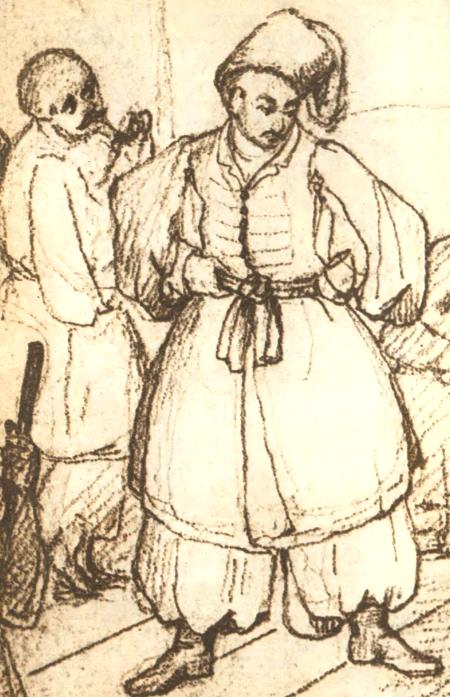
Illustrations by Taras Shevchenko. Cossacks Feasting. Detail.
THE RED BANQUET
Throughout Ukraine the clang of bells
Proclaims the day of doom;
The Haidamaki fiercely, yell:
"The gentry's end has come!
The gentry's finished! We shall set
A fire to sear the sky!"
The very clouds are painted red —
The province is on fire.
Medvedivka's the first to burn
And heat the clouds above.
Smila is next, the country 'round
Well-nigh aflood with blood.
Korsun and Kaniv are ablaze,
Cherkassy, Chigirin;
Along the Highway spread the flames
As far as the Volyn,
And blood flows freely. Gonta's made
Polissya his domain,
While near Smila bold Zaliznyak
Tests his Damascus blade —
In old Cherkassy, where his dirk
That has been sanctified,
Yarema, too, tries out. "Good work!
The mad dogs all must die!
Good work, my lads!" so Zaiiznyak
Shouts in the market-place
Which now's a hell; and through that hell
The Haidamaki race.
Yarema — a blood-curdling sight —
In battle-frenzy fells
Three-four at once. "Good work, my boy!
Their souls be damned to hell!
Kill, kill! You'll either win high rank,
Or go to paradise!
Now, children, ferret out the rats!"
The rebels in a trice
Spread out to cellars, attics, nooks
To search for hiding foes;
They killed them all, all goods they took.
"Now you may stop, my boys!
You've tired yourselves, now rest a bit."
The market squares and lanes,
With corpses strewn, are flowing red.
"More vengeance yet we claim!
Go over them a second time
To make sure, doubly sure,
That the vile dogs will never rise,
And never plague us more!"
The Haidamaki after that
Assemble in the square.
Yarema on the outskirts stands.
"Come closer, don't be scared,"
Shouts Zaliznyak. "I'm not afraid!"
With cap in hand he comes
Up to the chief. "Where from, my lad?"
"Vilshana is my home."
"Vilshana? Where the villains slew
The warden of the church?"
"What's that? They slew?"
"His daughter, too,
According to reports,
They carried off. You knew them well?"
"They took some girl away?"
"The warden's daughter, so they tell."
"Oksana!" Just the name
Yarema whispered and he fell
Unconscious where he stood.
"Oho! So that's what.... The poor lad!
Mikola, bring him to!"
Mikola brought him to. He cried:
"A hundred hands I need,
A blade in each, to extirpate
The Polish gentry breed!
Revenge, such terrible revenge
'Twill put hell in the shade!"
"Well said, my lad, to keep that pledge
There'll be no lack of blades.
Come with us to Lisyanka now,
We'll temper there our steel!"
"Oh father, quickly let us go!
I'll follow where you lead,
I'll follow to the ends of earth
I'll go to hell below
To tear her from the devils, sir!
To the earth's end I'd go....
But I'll not find her anywhere,
I'll never see her more!"
"Perhaps you will. Don't give up hope.
Now tell us what's your name?"
"Yarema."
"And your surname, boy?"
"I have none!"
"No surname?
Were you a bastard? In the lists,
Mikola, put him down
As ... let us find a name that fits —
How does Hasnothing sound?
Let's name him that!
"No, that's not it!"
"Is Hardluck better, friend?"
"No, that won't do."
"Here, wait a bit,
Halaida, that's the name!"
They wrote it down. "Halaida, lad,
Now we'll go out to play
You'll find good fortune ... maybe, bad.
Well, boys, let's on our way!"
From extra horses in the camp
They gave one to the lad.
He laughed as on his horse he leapt,
And then again was sad.
Outside the city gates they rode;
Cherkassy was in flames....
"All here, my sons?"
"Yes, every one!"
"Let's go then!"
Like a chain
Along the Dnieper's wooded banks
The Cossack column winds.
Behind them on a little nag
The minstrel Volokh rides,
And as from side to side he sways.
He sings a new-born lay:
"Oh, Zaliznyak his Cossacks brave
Leads for an outing gay!"
Cherkassy's left behind, the flames
Still leaping to the cloud.
No one looks back. Nobody cares!
They only laugh aloud
And curse the gentry vile. Some talk,
Some listen to the song
The minstrel sings. While Zaliznyak
Rides at the head alone,
With glowing pipe, his ears alert
To any night surprise;
Yarema, too, without a word
Behind his leader rides.
The green groves and the darker woods.
The Dnieper and the hills,
The sky, the stars, the people, goods,
And his o'erwhelming ills —
All disappeared, all are no more!
He nothing knows or sees —
Just like a corpse. His heart is sore
And yet he does not weep.
He does not weep: the vicious snake
That's coiled within his breast
Drinks up his tears, his heart that aches
It tears to tiny shreds.
Oh, soothing tears! Oh, healing tears!
You wash away all woes;
Wash mine away.... I cannot bear
This ache that's in my soul!
Not all the water in the sea
Or in the Dnieper wide
Can calm my heart and drown my grief;
Is nought but suicide
Then left for me? Oksana, dear!
Oksana, oh my own!
Where have they taken you? I fear....
Perhaps the beasts have thrown
Her in a dungeon where in chains
She lies awaiting death,
The gentry cursing and her fate
With her last, dying breath.
Perhaps Yarema she recalls,
Vilshana, and her home,
Perhaps in thought to him she calls:
"Yarema, darling, come,
Take your Oksana in your arms!
Thus we'll together sleep
Forever. Let them work their harm —
We'll be beyond their reach, we'll be!..."
The wind blows from beyond Liman
And bends the poplar low —
A maiden also may be bent
Beneath misfortune's blows.
She'll grieve awhile, but time will pass
And all may be forgot....
Maybe... a lady, richly dressed,
She with some Pole.... O God!
The worst of tortures ever planned
In hell for sinful souls
I'll suffer, but I could not stand
That final fiendish blow:
"My heart would break though it were stone
If ever that came true!
Oksana, darling! Oh, my own!
Where have they taken you?
Where are you held, where are you hid?"
Then tears began to flow
In torrents like a summer rain
Or like a springtime flood.
Then came the dawn. Zaliznyak reined
His horse beside a wood:
"Here's where we turn off from the road
And turn our horses free!"
The Cossacks rode into the grove
And soon were hid by trees.
Original publication: Тарас Шевченко. "Гайдамаки", поема. "Червоний бенкет".
* * *
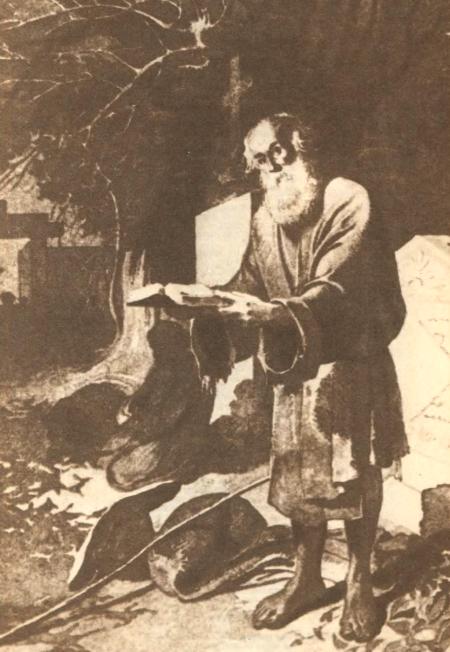
Illustrations by Taras Shevchenko. Beggar in Graveyard. Detail. Sepia. 1859.
HUPALIVSHCHINA
The rising sun found all Ukraine
In ashes or in flames,
Just here and there behind locked doors
The gentry trembling waits.
Each village has its gallows-trees
With corpses thickly hung —
Just of the bigwigs, smaller fry
Are piled in heaps like dung.
At cross-roads and along the streets
The dogs and ravens feed
On human flesh and pecked-out eyes;
And no one pays them heed.
There's no one left, only the dogs
And groups of children roam —
The women, too, took oven-prongs,
And Haidamaki joined.
Such evil 'twas that then engulfed
The whole of the Ukraine!
'Twas worse than hell.... And yet, what for?
For what were people slain?
They're so alike, one father's sons —
They should as brothers be.
But no, they could or else would not,
They had to disagree!
Blood had to flow, fraternal blood,
For one's with envy filled
Because his brother's bin is full,
His fields give handsome yield!
"Let's kill our brother! Burn his home!"
No sooner said than done.
And all was over! But not quite,
For there were orphan sons.
They grew in tears — but they grew up;
Their toil-worn hands they freed
And turned to vengeance — blood for blood
And hurt for hurt their creed!
The heart is sore when you reflect
That sons of Slavs like beasts
Got drunk with blood. Who was to blame?
The Jesuits, the priests!
The Haidamaki through ravines
And forests made their way,
Halaida riding in their midst,
His heart in constant pain.
Voronivka, Verbivka, too,
Already are behind,
And here's Vilshana. "What to do?
Shall I stop and inquire
About Oksana? Better not,
So no one knows my woe."
The Haidamaki meanwhile trot
Along the village road
Without a halt. Halaida hailed
One of the little lads:
"Is't true the warden here was slain?"
"Why no, my father says
The Polish lords burned him to death —
The ones that lie out there.
Oksana, too, was carried off,
My father says, somewhere.
The funeral...." He did not wait,
But gave his horse the spur.
"Why did I not die yesterday
Before I ever heard!
If I should die today, I know
I'd rise up from the grave
To take revenge upon the Poles.
Oksana! Where did they
Take you, my own?"
He bowed his head
And let his horse walk free.
Oh, it is hard for a poor lad
To hold in check his grief.
He catches up. The place they pass
Where inn and stables stood —
There's nothing now but smoking ash,
And Leiba is gone, too.
Yarema smiled — a mirthless grin
That fearful was to view.
Two days ago here he had been
A slavey to the Jew,
And now.... His heart began to pine
For those bad days of old.
The rebel band passed the ravine
And turned off from the road.
They came upon a stripling lad —
A patched coat on his back,
His shoes were bast, he also packed
Upon his back a sack.
"Hey, wait a minute, beggar boy!"
"I am no beggar, sir,
The Haidamaki I have joined!"
"A sight you are, for sure!"
"From where, young scarecrow, do you hail?"
"From Kerelivka way."
"Do you know Budishch and the lake?"
"Of course I know the place —
Go down that gully, it will lead
You straight to Budishch lake."
"Are any gentry to be seen?"
"There's not a one today,
Though yesterday were quite a few.
We couldn't bless our wreaths —
The Poles would not allow us to.
That's why we killed the beasts!
My dad and I used blessed blades,
While mother's sick in bed,
Or else she too...."
"Fine, that's the way!
Here's something for you, friend,
A ducat, which you must not lose."
He took the golden coin,
Inspected it, then said, "Thank you!"
"Well, let's get going, boys!
But don't make any noise, d'ye hear?
Halaida, follow me!
Beside this lake in the ravine
There is a clump of trees
In which a Polish treasure's found.
When we come to the wood
We will surround it without sound
In case some Poles still should
Be left on guard."
When they arrived,
They stood about the wood
And looked — but saw no sign of life....
"Oho, the devil's brood
Is here all right! What pears I see
Up there among the leaves!
They must be ripe! Just shake the trees!"
Like rotten pears, indeed,
The Poles came tumbling to the ground
To meet the penal blade.
The Cossacks scoured till all were found
And not one live remained,
Then found where treasure chests were hid
And took away the gold,
Ransacked the pockets of the dead,
And on their mission rode
on to Lisyanka.
Original publication: Тарас Шевченко. "Гайдамаки", поема. "Гупалівщина".
* * *
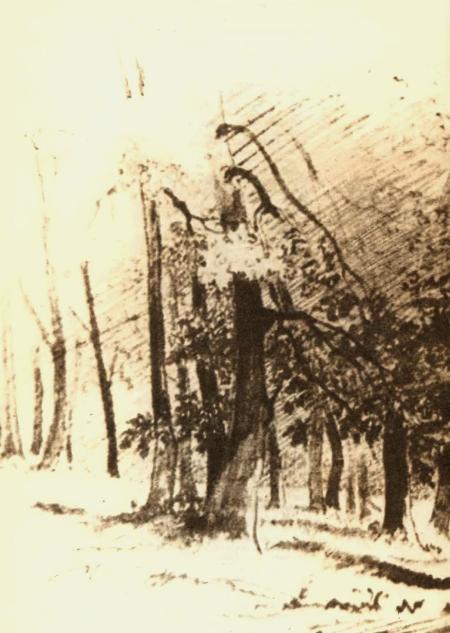
Illustration by Taras Shevchenko. Edge of Forest. Pencil, pen and India ink. 1859.
GONTA IN UMAN
As to Uman they made their way,
The Haidamaki bragged:
Their silks and satins we will take
To make ourselves foot-rags!
The days go by, the summer wanes,
And the Ukraine is still ablaze;
In hamlets hungry children wail —
Their parents gone. The yellow leaves
Of autumn rustle in the trees;
The clouds roll by; the sun is glazed;
No sound is heard of human speech;
In villages the beasts that feed
On human corpses howl. The Poles
Were left unburied, food for wolves,
Until the heavy winter snows
Concealed their bones....
The raging snow-storms did not stop
The vengeance worse than hell:
The Poles froze, while beside the fires
The Cossacks warmed themselves.
Spring came and woke the sleepy earth
From its deep winter sleep:
With primroses it was adorned
And periwinkles sweet;
The larks in fields and nightingales
In groves each morning sing
Their sweetest songs in joyful praise
Of earth adorned by spring....
A heaven truly! And for whom?
For people. Yes, but they?
They do not even want to look,
Or that it's poor, they say.
They want it tinted up with blood
And brightened with a blaze;
The sun and blooms aren't bright enough,
And clouds cast too much shade.
What they mean is: too little hell!
Oh people! Will you e'er
Be satisfied with what you have?
Oh, people, you are queer!
To blood and human savagery
Spring did not bring a halt.
It's terrible.... Yet 'twas the same
In ancient Troy, recall,
And will be in the future, too.
The Haidamaki rode —
And where they went the earth was scorched
And washed with human blood.
Maxim acquired a worthy son,
Renowned throughout Ukraine;
Yarema, though adopted, is
His true son just the same.
While Zaliznyak is well content
To smile the Poles and slay,
Yarema rages — he would spend
In carnage night and day.
He shows no mercy, does not spare
Or miss a single Pole —
For the churchwarden's death he makes
Them pay a hundredfold,
And for Oksana.... At the thought
Of her his heart grows faint.
"Go to it, son!" cries Zaliznyak,
"We'll dance until our fate
Wills otherwise!"
And so they did:
Along the entire way
From Kiev to Uman the dead
In heaping piles were laid.
The Haidamaki on Uman
Like heavy clouds converge
At midnight. Ere the night is done
The whole town is submerged.
The Haidamaki take the town
With shouts: "The Poles shall pay!"
Dragoons are downed, their bodies roll
Around the market-place;
The ill, the cripples, children too,
All die, no one is spared.
Wild cries and screams. 'Mid streams of blood
Stands Gonta on the square
With Zaliznyak together, they
Urge on the rebel band:
"Good work, stout lads! There, that's the way
To punish them, the damned!"
And then the rebels brought to him
A Jesuit, a monk,
With two young boys. "Look, Gonta, look!
These youngsters are your sons!
They're Catholics: since you kill all,
Can you leave them alone?
Why are you waiting? Kill them now,
Before your sons are grown,
For if you don't, when they grow up
They'll find you and they'll kill...."
"Cut the cur's throat! As for the pups,
I'll finish them myself.
Let the assembly be convened.
Confess — you're Catholics!"
"We're Catholics.... Our mother made...."
"Be silent! Close your lips!
Oh God! I know!" The Cossacks stood
Assembled in the square.
"My sons are Catholics.... I vowed
No Catholic to spare.
Esteemed assembly!... That there should
Be no doubt anywhere,
No talk that I don't keep my word,
Or that I spare my own....
My sons, my sons! Why are you small?
My sons, why aren't you grown?
Why aren't you with us killing Poles?"
"We will, we'll kill them, dad!"
"You never will! You never will!
Your mother's soul be damned,
That thrice-accursed Catholic,
The bitch that gave you birth!
She should have drowned you ere you saw
The light of day on earth!
As Catholics you'd not have died —
The sin would smaller be;
Such woe, my sons, today is mine
As cannot be conceived!
My children, kiss me, for not I
Am killing you today —
It is my oath!"
He flashed his knife
And the two lads were slain.
They fell to earth, still bubbling words:
"O dad! We are not Poles!
We ... we...." And then they spoke no more,
Their bodies growing cold.
"Perhaps they should be buried, what?"
"No need! They're Catholic.
My sons! Why did you not grow up?
My sons, why weren't you big?
Why did you not war 'gainst the foes
With me as Cossacks brave?
Your mother. Catholic accursed,
Oh why did you not slay?...
Let's go, my brother!"
With Maxim
Across the square he treads;
They cry together: "Punish them
Till every Pole is dead!"
And awesome was their punishment....
Uman went up in flames.
No house, no church, but had been searched,
And not a Pole remained —
They all were dead. Such carnage cruel
As at Uman that day
Had ne'er been seen. St. Basil's school,
Where Gotna's sons had stayed,
Was razed down to the very ground
By Gonta, raging wild.
" 'Twas you that ruined my little sons'"
With every blow he cried,
"You swallowed them when they were small
You taught them evil lore
And not the good!... Tear down the walls!"
The Haidamaki tore
The walls to pieces. 'Gainst the stones
They bashed the heads of priests,
And the young pupils still alive
They threw in cisterns deep.
Until late at night they slaughtered the Poles;
Not one was let live. Yet Gonta still raved —
Oh monsters, come out! Crawl out from your holes!
My sons you've destroyed-oh, cruel's my fate!
I've nobody now! For nothing to wait!
My sons, whom I loved, so handsome and good,
You're gone from me now. I'm thirsty for blood!
I want in the blood of the gentry to wade,
To drink it, and watch how it flows and turns black...
Oh winds, as ye blow, why waft ye not back
Some Poles for our blades?... Oh cruel's my fate!
And yet I can't weep! Ye stars in the sky,
Please leave me alone and hide behind clouds.
I murdered my sons!... My heart is wrung dry!
Where will I find peace?..." So Gonta cried loud;
And then in the square big tables were laid
Amid the debris, 'mid corpses and blood,
And loaded with looted liqueurs and fine food-
The rebels sat down. It was their last raid,
Their last supper too!" Make merry, my brood!
We'll drink while we may, and fight while we may!"
Old Zaliznyak cried. "We'll frolic, my lads!
Fast music, minstrel! Let earth really shake
Tonight in Uman when my Cossacks dance!"
And the minstrel played:
"My father's an innkeeper,
Shoemaker too;
My mother is a spinner,
Matchmaker too;
My brothers are brave fellows
They roam the woods,
A cow found in the forest,
Rich necklace too,
And I'm Khristya, a maiden
With beads so fine,
My needlework is made in
A leaf design.
With red boots my feet adorning,
I go milking in the morning —
I water the cow, I do,
And milk her too,
With the lads I stop to spoon,
I stop to spoon."
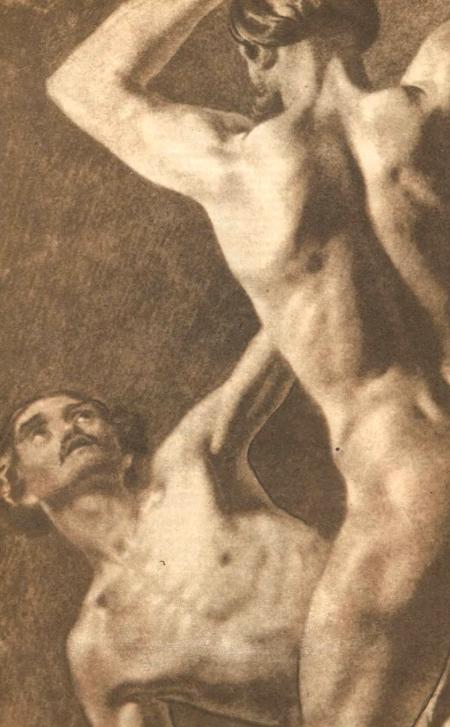
Illustration by Taras Shevchenko. Models. Detail. Charcoal and white chalk. 1840-1841.
"Heigh-ho! Supper's o'er,
Hey, children, lock the door,
Old woman, don't you fret,
Sidle up to me, my pet!"
The Cossacks dance. But one is gone....
Why does not Gonta dance?
Why joins he not in merry song,
Nor drinks he with the lads?
He is not there; his heart won't let
Him sing and dance and joke.
But who is he who silent flits
In black loose-hanging cloak
About the square? See, there he stops
And 'mong the dead he digs
As though he's searching. Then he stoops,
Two little bodies picks
And lifts them gently on his back
And carries them away
Behind the blazing church, where black
He fades into the shades
Of summer night. Who can that be?
It's Gonta, and his load —
His sons — he bears some place where he
Can cover them with sod,
So that the youthful Cossack flesh
Should not be food for dogs.
Down darker lanes, where fires are less,
And smoke serves as a fog
To screen him from all prying eyes,
The Cossack bends his steps,
So none should see how Gonta cries
Or where his children rest.
Out in a field, far from the road,
He lays them; takes his knife
And with the bless'd blade digs a hole.
Uman supplies the light
So he can see the work he does
And the two lads who lie
As though asleep still in their clothes....
Why do they fear inspire?
Why is it Gonta seems to hide
As though he were a thief?
Why does he shake? From time to time
The wind bears to the chief
The sounds of Cossack revelry;
He does not heed the noise —
A fine deep house amid the fields
He's building for his boys.
It's done at last. He lays his sons
Into their home, the hole,
His ears still ringing with the sound:
"Oh dad, we are not Poles! "
Then Gonta from his pocket takes
A crimson silken cloth,
The dead eyes kisses, then he makes
The sign of sacred cross,
And covers the young Cossack heads.
Then lifts the cloth again,
To gaze once more upon his dead....
The tears then gush like rain:
"My children! Open up your eyes,
Look at Ukraine, my boys:
For her, my sons, you gave your lives
And I, too, am destroyed.
Who will there be to bury me?
In some far foreign field
Who will there be to weep o'er me?
My fate is black indeed!
The most unfortunate of men,
I'm left alone, in pain!
Why was I granted children, then?
Or why was I not slain?
They would have laid me in the earth-
I bury them instead."
Again he kissed them, made the cross.
The cloth drew o'er their heads,
And earth he then began to pile:
"Rest in your hole, my sons,
Your mother, bitch, did not provide
Fine beds to lie upon,
Without corn-flower wreaths and rue,
My sons, you'll have to sleep
Please pray to God. I beg of you,
That he should punish me
Yet on this earth for what I did,
For this most awful crime.
Forgive me, sons! You I forgive
That Catholics you died."
He levelled off the earth and laid
Green sod upon the grave,
So none could tell where Gonta made
His sons' last resting place.
"Sleep well, my lads, and wait for me,
I will not tarry long.
My knife cut short your span of life,
The same will be my lot.
They'll kill me, too.... May it be soon!
But who will bury me?
The Haidamaki! Just once more
I'll join them on a spree! ..."
So Gonta went; his shoulders sagged,
He tripped as though were blind.
The burning city lit his path,
He raised his eyes and smiled —
A smile most awful to behold.
He looked back on the field,
And wiped his eyes.... And then by smoke
I The Cossack was concealed.
Original publication: Тарас Шевченко, "Гайдамаки", поема. "Гонта в Умані".
* * *
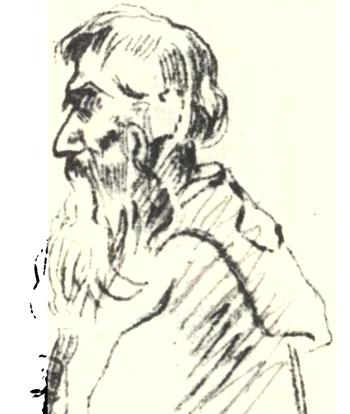
Illustration by Taras Shevchenko. Peasant. Pencil. 1843.
EPILOGUE
Much time has gone by, since a child a poor orphan,
In sackine and coatless, without any bread,
I roamed that Ukraine where Zaliznyak and Gonta
With sanctified sabres had wreaked vengeance dread.
Much time has gone by since, along those same highways
Where rode Haidamaki, exhausted and sore
I tramped through the country, its high roads and byways,
And weeping, sought people to teach me good lore.
As now I recall them, my youthful misfortunes,
I grieve that they're past! I would trade present fortune
If only those days could be brought back again.
Those evils, the steppes that seem stretching forever,
My father and grandfather old I remember....
My father is gone, but my grand-dad remains.
0n Sundays, on closing the book about martyrs
And drinking a glass with the neighbours, my father
Would beg of my grand-dad to tell us the story
Of the Haidamaki revolt long ago,
How Gonta, Zaliznyak once punishment gory
Inflicted on Poles. And the ancient eyes glowed
Like stars in the night as the old man related
How gentry folk perished and how Simla burned ..
The neighbours from horror and pity near fainted.
And I, a wee fellow, the churchwarden mourned,
Yet, nobody noticed, all gripped by the horror,
The child that was weeping alone in the corner.
I thank you, my grand-dad, 'twas you that preserved
The story I've told of the old Cossack glory:
And by the grandchildren it now will be heard.
I beg your pardon, readers dear,
That artlessly I spin
This yarn of bygone Cossack feats,
Without the bookish skill.
I'm just repeating grand-dad's tale —
Good health to him! — and he
Ne'er dreamed that there would come a day
When learned folk would read
His narrative. Now don't be hurt,
Old grand-dad — let them rant.
And in the meantime I'll return
To my small rebel band,
And when I've led them to the end,
I'll rest — and then again,
At least in dreams, my eyes shall look
Upon that fair Ukraine
Where once the Haidamaki roved
And awful vengeance wreaked,
Whose roads I measured years ago
With blistered naked feet.
The Haidamaki had a spree,
Made merry unrestrained:
With gentry's blood almost a year
They watered the Ukraine,
Then were no more — their dented blades
Were put away to rust
And Gonta's gone: no cross or grave
To mark his place of rest.
O'er all the steppe the wild winds swept
The Cossack dust away,
No one was left to mourn his death
Or for his soul to pray.
A foster-brother yet remained
Alive upon the earth;
But when he learned the fiendish fate
The devils had reserved
For Gonta, how his brother died —
For the first time in life
Old Zaliznyak began to cry.
He did not wipe his eyes,
But pined away, and soon was dead;
He died in foreign parts,
In foreign earth his bones were laid:
So hapless was his lot!
Their iron chief with deepest grief
The Haidamaki bore
To bury in a foreign field;
They built a mound, and mourned
Awhile, then brushed their tears away
And went back whence they came.
Yarema, leaning on his staff,
Long stood beside the grave,
"Rest, father, in this foreign place,
For in our native land
No longer is there any space,
Nor freedom to be had....
Sleep soundly, honest Cossack soul!
You won't forgotten be."
Across the steppe Yarema went,
His tears still flowing free,
And he kept always looking back,
Till he was lost to sight.
Then just the grave mound in the steppe
Was dark against the sky.
By Haidamaki with good seed
Ukraine had then been sown,
The harvest, though, they did not reap.
So what is to be done?
The seeds of justice did not sprout;
Instead, injustice grew....
The Haidamaki all dispersed,
Each chose what he would do:
Some just went home, but others took
To forests with their blades
To prey on merchants. This repute
To our own days remains.
The ancient Cossack fortress, Sich,
Then later was laid waste:
Some Cossacks 'cross the Danube fled,
Some to Kuban escaped;
That's all that's left — except the plaint
The Dnieper rapids howl:
"They finished off our sons, and aim
To pulverise us now! "
But people, passing by, don't heed
The rapids' angry roar;
And the Ukraine is fast asleep,
Asleep for evermore.
Since those grim years the grain grows green
And lush across Ukraine;
No screams are heard, no carnage seen;
The winds blow 'cross the plains,
They bend the willows in the wood
And grasses on the lea.
Now silence reigns. That is what God
Has willed. So let it be.
But sometime, when the day is done,
And all is warm with spring,
Old Haidamaki walk along
The Dnieper's banks and sing:
"Our good Halaida's house has floors.
Let the sea surge! Let the sea swell!
Halaida, all will yet be well! "
Original publication: Тарас Шевченко. "Гайдамаки", поема. Епілог.
|
|
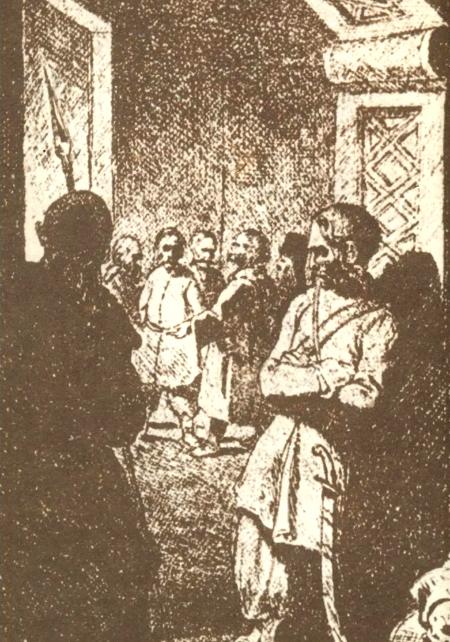















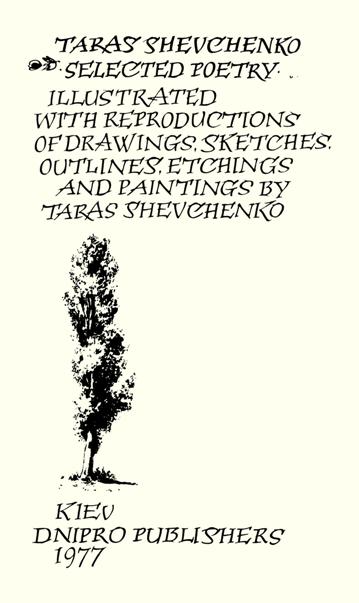
Good poem by Shevchenko, to read and understand the present time Ukraine.